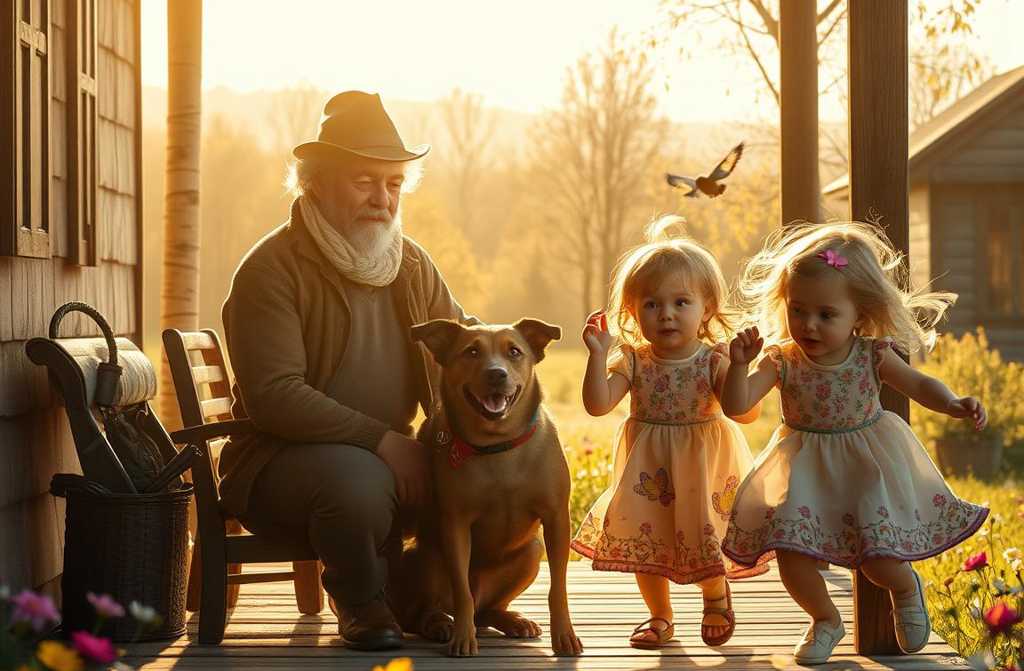In the village, life unfolded in full view of all. Few secrets could be kept for long, and so it was with this family. The couple had married by mutual choicea fine pair, both tall and hardworking. Their well-kept home, which they had rebuilt themselves, and the yard, where weeds had long been banished in favor of flowers that bloomed all summer, spoke of their diligence. The young wife was always kind to everyone, respected for never gossiping. Her husband, though quiet, was not the gentle sort of quiet manthere was a hardness to him, even cruelty at times. It ran in his blood, passed down from his father and grandfather. Yet he was never harsh with his wife. He took on the hardest chores, drove to town without complaint to buy her new things, and never spared the expense. He had another virtue, too: he refused to join the village men in their drinking. They had invited him at firsteager for another to share their vicebut he would only say, “Not for me,” and that was enough. He never raised a hand to his wife either, and some of the village women envied her for it. She had tried, at first, to advise them not to endure beatings, but they dismissed her, saying she was simply lucky. The bitterest among them muttered that her fortune might not lastperhaps one day she, too, would flee to the hayloft to escape her husbands fists. She never answered such remarks, pitying the women who allowed themselves to be trampled.
But there was sorrow in this house too: four years of marriage, and still no child. Both were healthy, yet they remained a family of two.
Then one day, a neighbor begged them to take a puppyher spaniel, Betsy, had birthed eight. Seven had found homes; only the runt remained, small but sweet. “Take her,” the neighbor urged. “Youll fatten her up, train her well. Shell be a lively little bell in your yard.” To his wifes surprise, the husband agreed. And so they welcomed Dolly into their home.
It was hard to say who doted on her morethe wife or the husband. He taught her commands, carried her to the shed when it rained, and when she grew, built her a kennel: spacious, with a wooden floor. He trained her to sleep there, though they let her roam at nightshe always returned, knowing her place.
Then, the wife noticed first, then the husband: Dolly was expecting. And here the mans true nature flared. He grew furiousno, he hated the dog. He chained her and warned, “If I catch you outside the yard, dont expect to come back.”
The day came when Dolly birthed four pups in her kennel, all in the night. They heard nothing. Only in the morning, when the husband went to fetch her fresh water, did he see the litter. He stormed back inside. “Dollys turned the place into a kennel,” he told his wife. “Four of them, born last night.”
“Goodness!” she cried, delighted. “And not a sound! Let me see.”
“See them while you can,” he said. “Before I drown them.”
She stared. “Drown them? Tiny pups? And what of Dolly? Do you think a mother feels nothing? That she has no instinct?” She clutched at straws. “Ill ask aroundsomeone might want a dog”
But he was already outside. She followed, watching in horror as he filled a barrel with waterfive buckets drawn from the well. She crouched before the kennel, tears streaming as she saw the four tiny shapes clinging to Dolly. She knew some did this to unwanted litters, but she had never witnessed such cruelty.
Knowing him, she knew she could not stop him. She went inside, shut the doors and windows, so she would not see or hear the execution.
Later, he came in. “They felt nothing,” he said. “Still blind. I buried them at the far end of the garden.”
She whispered, “Does Dolly understand?”
“Who knows? I didnt ask. Shouldve kept her locked up at night.”
A wail rose from outside.
“Shell stop,” he said. “Maybe shell learn not to stray.”
Something in her broke then. Yes, litters were often culled in the villagekittens, pupsbut why so cruelly?
That day, she barely spoke to him. He held his ground, muttering, “Sentimental nonsense. Wholl feed them? Clean up after them? Or does that not matter?”
Dolly wandered the yard, her eyes wet with what some might call impossible tearsbut the wife saw them. She felt guilty. Later, she noticed Dolly sitting at the far end of the garden, motionless, where the pups lay buried.
Twice more, Dolly bore litters. Twice more, the enraged husband filled the barrel. Twice more, the pups drowned. Dolly was chained for weeks as punishment. The wife could not grow used to it. She began to drift from her husbandnot considering leaving, but what had once bound them frayed.
Then came the final cruelty. Dolly was expecting again, her belly swollen. She waddled, too heavy to run. Autumn had come, and she seldom left the kennelthe cold was too much. But she did not freeze. One morning, the husband took his shotgun, lifted Dolly under his arm, and walked to the pond. There, he shot her, the pups still unborn.
An old neighbor, the very one who had given them Dolly, witnessed it. She stood frozen, tears on her wrinkled cheeks as he passed. “What have you done, boy?” she whispered. “Youve taken livesnot just a dog and her litter, but a mother and her unborn. Do you not fear the Lord might do the same to your own?”
He glared but said nothing. What did she know? Her own yard was overrun with strays, her cupboards near empty. Yet her words lodged in him, deep.
At home, he meant to tell his wife, choosing his words carefullyknowing it would wound her. But she met him with news: “I think Im pregnant.”
Joy swallowed everything. At lastthis long-awaited miracle.
“Get ready,” he said. “Well drive to the hospital.”
At the clinic, tests confirmed it: five weeks along. He would have waited forever for such news. Now they lived for the future, talking of cots and names, resisting the urge to buy everything at once.
A month before the due date, she fell ill with fever. Thenworsethe baby stopped moving. They rushed to the hospital. The doctor sent her to the delivery room. He waited, time crawling, until the physician emerged. “We saved your wife,” he said. “The child was stillborn.”
Stumbling outside, he wept. Then, thinking of his wifehow much greater her painhe rushed back. “Was it a boy or girl?”
The young nurse checked. “A boy.”
In his wifes room, he kissed her hand. “Youll recover. Well have children. The doctor promised.”
She tried to smile.
For a year, they followed the doctors orders. She rested outdoors, solving crosswordsa habit from her days at the village library. He brought fresh cream and curds each morning. Slowly, she healed.
Then, one day, she met him with shy joy: “Its happened again.”
This time, they spoke little of it, fearing to tempt fate. But at eight months, labor came early. The ambulance saved herbut not the child. A girl, stillborn.
A week later, he returned to the hospital alone. “Why? Whats wrong with us?”
The doctor shook his head. “A mystery. Both times, no warning.”
At home, his wife was a ghost. “Find a proper wife,” she murmured. “Im barren.”
That word*barren*a brand no woman wished to bear.
He seethed. “Dont say such things!”
But how to help her? She barely ate, barely lived. Was itcould it bea curse?
Then he remembered a neighbors tale: her son-in-law, ill beyond doctors help, had sought a wise womans aid. Perhaps the same could lift this shadow.
He stole a photo of his wifeone from the village halland drove to old Agnes, the seer. Her cottage smelled of lavender and incense. Before he could speak, she said, “Your wife is blameless. *You* took livesneedlessly.”
He stormed out. “Liar!”
But driving home, he recalled the neighbors words the day he killed Dolly: *Do you not fear the Lord might do the same to your own?*
Horror struck. Had he murdered? Was this punishment?
The next day, he went to the cathedral, confessing to an old woman lighting candles. “How do I atone?”
“Light a candle for your wife,” she said. “Then help those in need. Theres a shelter for dogs near here. Go.”
He did. The dogsabandoned, savedwatched him with knowing eyes. He asked what they needed most. Not food, but cleaning supplies. Then, a request: “Could you drive the vets? Its far for them.”
He agreed. For months, he returned, learning their names, earning their trust.
Then he met Bennya tiny, one-eared poodle, found near the railway. Starved, ragged, but alive. He drove Benny to the vet, murmuring storiesof the army, of meeting his wife. Only Dolly went unmentioned.
One evening, he dared to bring Benny home. His wife, pale and listless, barely glanced upuntil Benny licked her palm.
“Wheres your ear?” she whispered.
That night, Benny slept on her pillow. In the morning, she made breakfastthe first in months.
He marveled. Benny was a healer.
Weeks later, she whispered, “Im pregnant.”
This time, it was true. Twinstwo little girlsnow raced with Benny through the house.
His past cruelty was gone, erased by kindness. He knew now: without hardness, life was lighter. For all.







